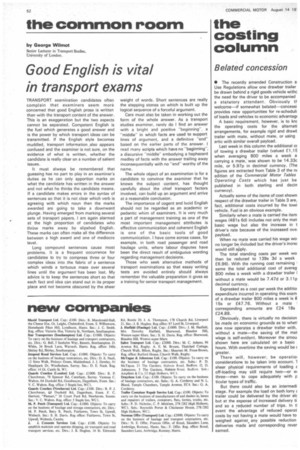by George Wilmot
Page 54

If you've noticed an error in this article please click here to report it so we can fix it.
Senior Lecturer in Transport Studies, University of London.
Good English is vital in transport exams
TRANSPORT examination candidates often complain that examiners seem more concerned that good English prose is written than with the transport content of the answer. This is an exaggeration but the two aspects cannot be separated. Competent English is the fuel which generates a good answer and is the power by which transport ideas can be transmitted. If the English style becomes muddled, transport information also appears confused and the examiner is not sure, on the evidence of what is written, whether the candidate is really clear on a number of salient issues.
It must always be remembered that guessing has no part to play in an examiner's duties as he can only apportion marks on what the candidate has written in the answer and not what he thinks the candidate means. If a candidate makes errors in the syntax of sentences so that it is not clear which verb is agreeing with which noun then the marks awarded are going to take a downward plunge. Having emerged from marking several sets of transport papers, I am again alarmed at the high proportion of candidates who throw marks away by slipshod English. These marks can often make all the difference between a high award and one of mediocre level.
Long compound sentences cause most problems. It is a frequent occurrence for candidates to try to compress three or four complex ideas into the fabric of a sentence which winds a tortuous maze over several lines until the argument has been lost. My advice is to keep the sentences short so that each fact and idea can stand out in its proper place and not become obscured by the sheer weight of words. Short sentences are really the stepping stones on which is built up the logical sequence of a forceful argument.
Care must also be taken in working out the forin of the whole answer. As a transport studies examiner, rarely do I find an answer with a bright and positive "beginning", a "middle" in which facts are used to support lines of argument, and a definitive "end" based on the earlier parts of the answer. I read many scripts which have no "beginning", a discursive "middle" embodying a haphazard medley of facts with the answer trailing away inconsequentially with no "end" worthy of the name.
The whole object of an examination is for a candidate to convince the examiner that he knows the subject content, has thought carefully about the chief transport factors involved, can build up an argument and arrive at a reasonable conclusion.
The importance of cogent and lucid English should not be regarded as an academic or pedantic whim of examiners. It is very much a part of management training as one of the most important management attributes is effective communication and coherent English is one of the basic tools of good communication. I have come across cases, for example, in both road passenger and road haulage units, where labour disputes have been the direct result of ambiguous wording regarding management decisions.
Those who seek alternative methods of transport examinations so that essay writing tests are avoided entirely should always remember the valuable preparation it gives as a training for senior transport management.




























































































